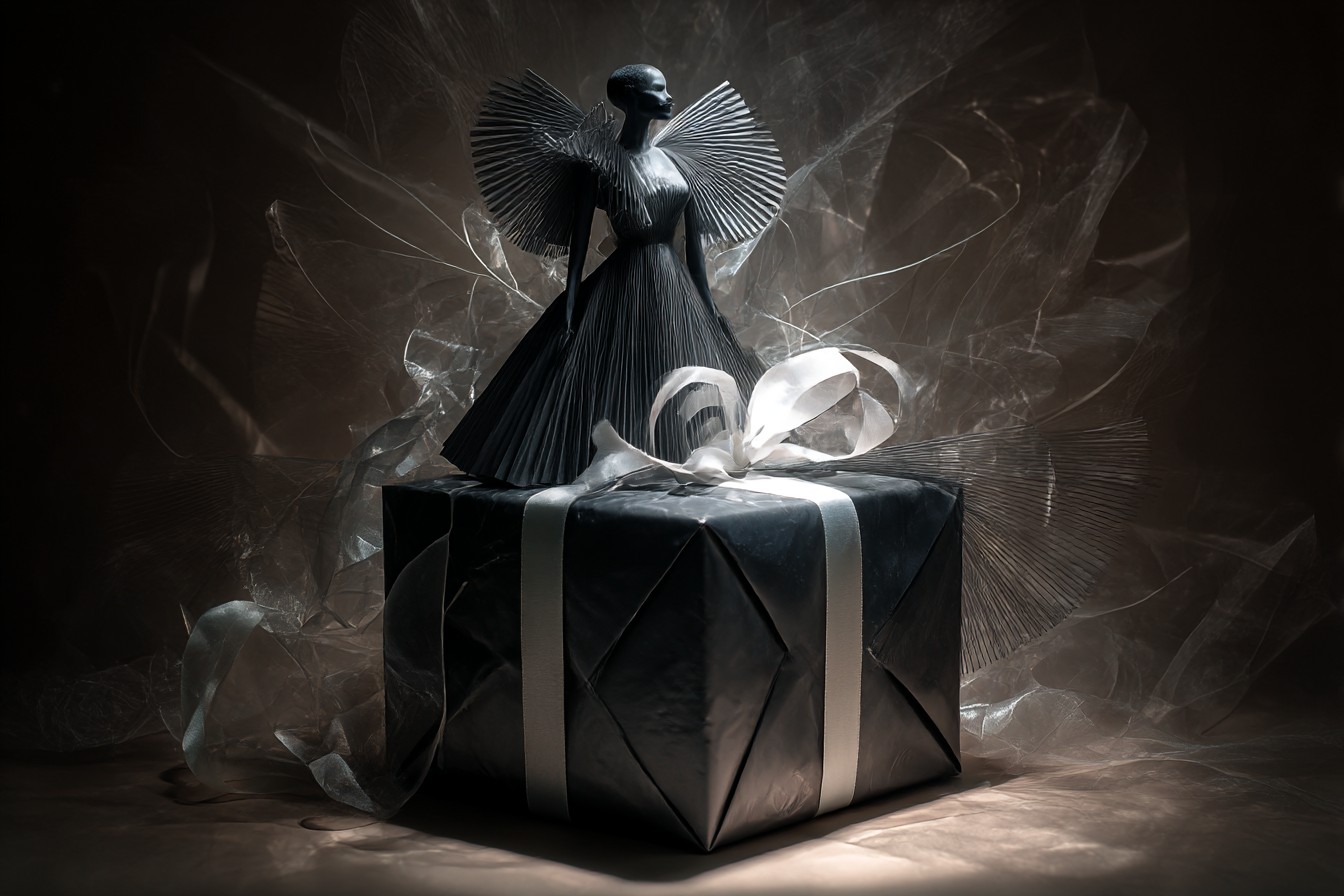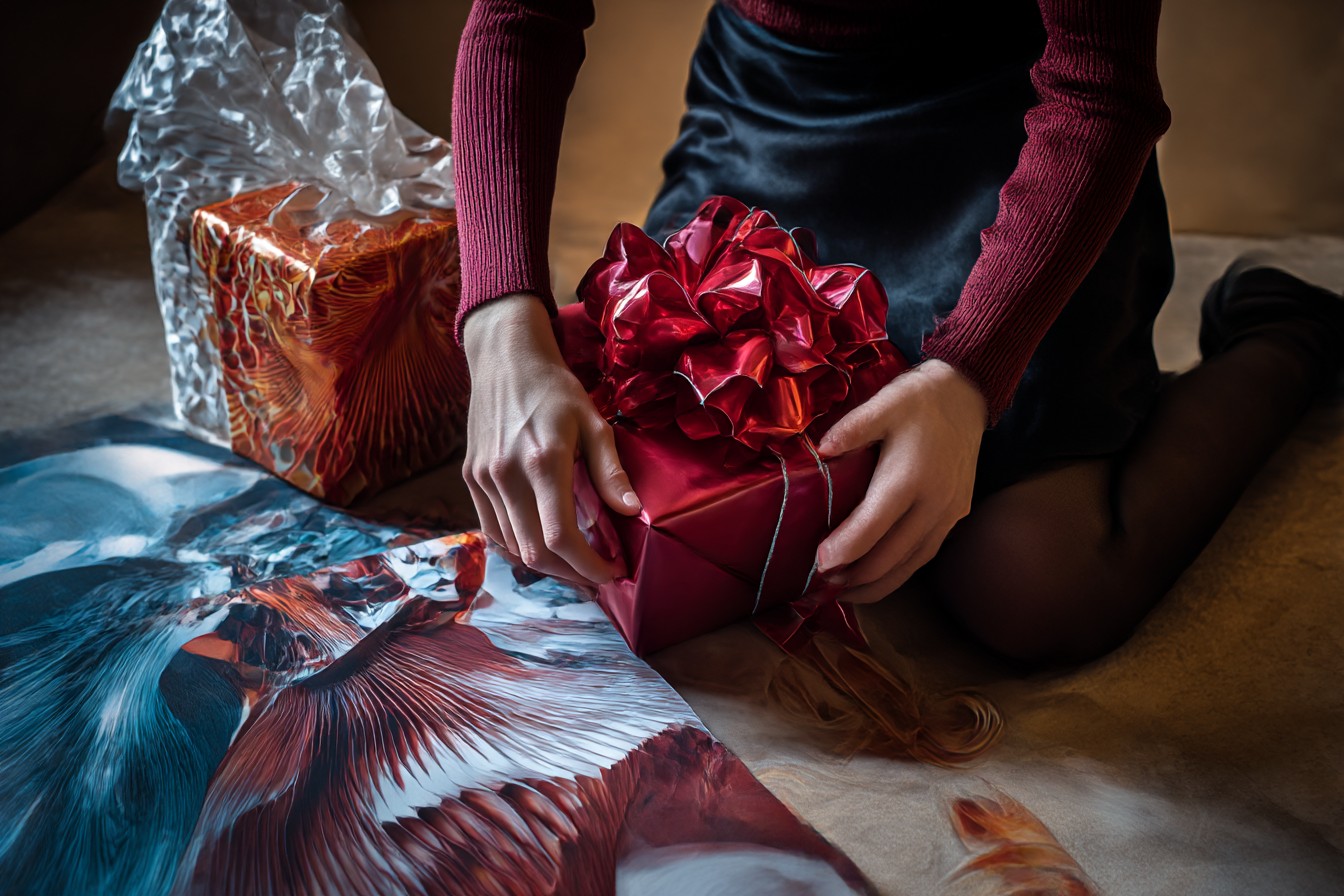Let me tell you something embarrassing. Last Christmas, I had a complete meltdown in my car after leaving my in-laws’ house. Not the dignified kind of crying where a single tear rolls dramatically down your cheek. No, this was the ugly-sobbing, mascara-everywhere, can’t-catch-your-breath variety that made the teenager walking his dog past my parked car do a concerned double-take.
And what triggered this festive breakdown? A scarf. A perfectly lovely cashmere scarf from my mother-in-law that I should have been thrilled to receive.
“It’s beautiful,” I had said, running my fingers over the soft fabric. “Thank you so much.” Meanwhile, my brain was spiraling: Did she not like the personalized recipe book I’d spent weeks creating for her? Was the scarf a hint that my usual winter accessory choices were lacking? Why did I suddenly feel seven years old again, desperately wondering if I was enough?
Gift anxiety is my personal holiday tradition. I’ve been perfecting it since childhood, right alongside decorating cookies and watching “Love Actually” while drinking too much wine.
For someone whose actual job involves understanding gift psychology, you’d think I’d have this figured out. But that’s the funny thing about anxiety—it doesn’t really care about your credentials or expertise. It just shows up, uninvited, like that distant relative who always comments on your weight gain while helping themselves to a third slice of pie.
I wasn’t always this way. As a little kid, I approached gift exchanges with the pure, unfiltered joy that only children possess. There’s a photo of me at five, proudly presenting my dad with a pinecone I’d covered in glitter. The look of absolute confidence on my face is something I now find both hilarious and heartbreaking. I was so certain that this sparkly piece of yard debris was the greatest gift in human history.
Somewhere along the way—probably around middle school, when awareness of social hierarchy becomes your full-time job—that confidence fractured. I started noticing things. The slight hesitation before someone said “thank you.” The gift that disappeared into a closet, never to be seen again. The weird power dynamics that gifts create between people.
My friend Megan calls it “the obligation vortex”—that strange space where genuine desire to make someone happy gets tangled up with social expectations, budget concerns, and the fear of getting it wrong. We’ve all been there, right? Standing in a store, staring blankly at options while thinking, “Will this make them think I spent too much? Not enough? That I don’t know them at all? That I’m trying too hard?”
Gift-giving becomes this bizarre mind-reading exercise. You’re essentially saying, “I think I understand who you are, what you value, and what would bring you joy.” It’s incredibly intimate when you think about it. And incredibly stressful.
Jake (my husband, who approaches gift-giving with the casual confidence of someone who’s never once questioned if a gift card is inherently offensive) noticed my anxiety a few years ago. “You spend more time worrying about the gifts you give than any other single activity in your life,” he pointed out one night while I was up at 2 AM, reorganizing the “gift spreadsheet” for the third time that week.
“That’s not true,” I protested, fully aware it was absolutely true.
“You have seven—SEVEN—different wrapping paper options for your sister’s birthday present,” he said, gesturing to the rolls I’d laid out on our bedroom floor. “Meanwhile, you haven’t slept properly in three days.”
He wasn’t wrong. For someone who literally writes and speaks about the psychology of gifting for a living, I’d developed a remarkably unhealthy relationship with the whole process. The woman who confidently explained on morning television how to “take the pressure off holiday giving” was having panic attacks in Target because she couldn’t decide whether her nephew would prefer the dinosaur Lego set or the space one.
What makes it even more complicated is that I’m equally neurotic about receiving gifts. That Christmas meltdown? It wasn’t really about the scarf. It was about the overwhelming feeling that I was being seen—truly seen—and found wanting.
When someone gives me a gift that feels thoughtful and personal, I experience this rush of gratitude mixed with unworthiness. Like, “How lovely that you think I deserve this beautiful thing.” When someone gives me something that feels impersonal or obligatory, I spiral into questioning the entire relationship. “Have I been misreading our connection this whole time?”
I know, I know. It’s a lot of emotional weight to put on objects exchanged on special occasions. Trust me, my therapist Lisa and I have spent many profitable hours unpacking this particular quirk of mine.
The turning point came after that Christmas car cry. I was mopping up mascara with a fast food napkin I found in my glove compartment when I had a moment of clarity. I was ruining every gift experience—both giving and receiving—by loading it with expectations that no present, no matter how perfect, could possibly meet.
No wonder I was exhausted. No wonder gift occasions had stopped being joyful.
I actually started writing in a journal (not my gift notebook, an actual personal journal) about my relationship with giving and receiving. Some patterns emerged pretty quickly:
1. I was using gifts as emotional stand-ins. Instead of telling people I loved them or valued them, I was trying to demonstrate it through increasingly elaborate presents.
2. I was treating other people’s gifts to me as coded messages about our relationship rather than, you know, just nice things they thought I might like.
3. I had somehow developed the belief that the “perfect” gift existed for every person and occasion, and it was my personal failure if I couldn’t discover it.
Once I could see these patterns, I started developing some strategies to manage the anxiety. They weren’t overnight fixes—my brain doesn’t work that way, unfortunately—but they’ve made a massive difference over time.
First, I created a little ritual before any gift shopping or receiving occasion. I take five minutes to sit quietly and remind myself of what gifts actually are: expressions of connection, not tests of worthiness or affection. Sounds simple, but for me, it was revolutionary.
I also established some boundaries around my gift research. Two hours max for any individual gift search. No midnight online shopping. No more than three store visits per present. If I haven’t found something within those parameters, I go with my best option and—this is crucial—I forgive myself for not achieving some imaginary perfect standard.
For receiving gifts, I practiced (yes, actually practiced in front of a mirror, don’t judge me) focusing on the giver’s intention rather than my interpretation. When my mother-in-law gave me that scarf, she wasn’t making a statement about my gift to her or my fashion choices—she was giving me something warm and soft because she cares about me. Full stop.
I’ve started asking people more directly what they might like instead of trying to intuit it from scattered clues. Turns out, most folks are pretty happy to tell you what they want, and it doesn’t make the gift any less meaningful. My sister-in-law actually gasped with delight when she opened the exact food processor she’d mentioned wanting three months earlier. “You remembered!” she said. Yeah, I remembered—because I wrote it down like a normal person instead of trying to decode her kitchen needs through elaborate observation.
The most helpful shift, though, has been reminding myself that gift exchanges aren’t transactions—they’re connections. The point isn’t perfect equivalence or mind-blowing surprise; it’s the moment of human acknowledgment that happens when we offer something to someone we care about.
Last month was Jake’s birthday. In previous years, I would have orchestrated some elaborate multi-part gift experience involving his favorite things, childhood memories, and possibly skywriting. This year, I got him a really good chef’s knife (he’s been getting into cooking) and tickets to see his favorite band. When he opened them, I wasn’t anxiously scanning his face for the “right” level of appreciation. I was just happy to see him happy.
Later that night, he said something that nearly made me cry (the good kind this time): “You know what was different about today? You were actually here for it, not stuck in your head worrying about whether everything was perfect.”
That’s the thing about gift anxiety—it actually robs us of the very connection we’re trying to create. When we’re tangled up in our expectations and fears, we miss the beautiful simplicity of the exchange.
I still keep my gift notebooks. I still have a designated “present closet” with emergency gift options and more gift wrap than any reasonable human needs. Old habits die hard, and honestly, being organized about gifts is part of who I am. But these days, there’s less frantic energy behind it. The spreadsheets serve me; I don’t serve them.
As for receiving gifts? I’m working on it. Last week, a colleague gave me a candle that is absolutely not my taste. Two years ago, I would have spent hours wondering what this meant about our working relationship and whether I’d somehow projected “loves vanilla-scented everything” energy. This time, I thanked her sincerely for thinking of me, brought the candle home, and regifted it to my neighbor who actually does love vanilla-scented everything. No meltdown, no existential crisis.
Maybe that’s what growing up looks like—not the absence of our quirks and anxieties, but developing a gentler relationship with them. I’ll probably always care more about gifts than the average person. That’s okay. The goal isn’t to stop caring; it’s to care in a way that brings joy rather than stress.
So if you’re someone who breaks into a cold sweat at the thought of holiday shopping or feels slightly nauseated when unwrapping presents at your own birthday party, know you’re not alone. There are others of us out here, taking deep breaths in department stores and reminding ourselves that no gift has the power to define a relationship unless we give it that power.
And if all else fails, remember what my grandfather told me when I was about eight and crying because I thought my homemade Mother’s Day gift wasn’t good enough: “The only truly bad gift is one given without love.” Everything else is just details.









